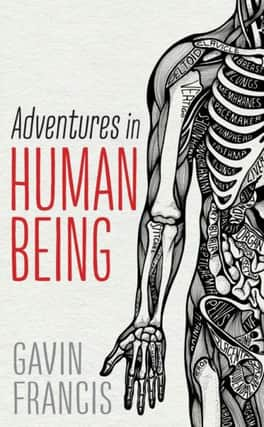Book review: Adventures in Human Being


Adventures in Human Being
Gavin Francis
Profile Books, 253pp, £14.99
His first book, True North, published in 2008, was a voyage of discovery around the Arctic Circle, taking in the Shetland Isles, the Faroes, Iceland, Greenland, Svalbard and Lapland, his travels serving as a framing device through which to view the exploits of some of the region’s earliest explorers. The follow-up, Empire Antarctica, which won the Scottish Book of the Year award in 2013, saw him spend a brutally cold winter at the opposite end of the planet, overwintering at the Halley research station on the remote Caird Coast.
Both those books reference his medical career – in True North he admits that it was working as a doctor in a “stinking hospital ward” in Africa that provided the impetus for his journey, making him feel the need for cold, clean, open spaces, while in Empire Antarctica it’s landing the job of base doctor at Halley that gives him his golden ticket to spend 14 months on the Great White Continent.
Advertisement
Hide AdAdventures in Human Being, however, is the first book he has written in which medicine really takes centre stage, although traces of his love of geography aren’t hard to find. Starting at the head, Adventures in Human Being takes us all the way down the body to the feet, via chapters on the lung, heart, liver, kidneys, hips and more. This structure, Francis explains, reflects that of most anatomy textbooks, but it also makes the book an account of a physical journey – albeit one that only covers a very modest distance – and as such it could, at a push, be described as a travelogue.
In common with anatomy textbooks, Adventures in Human Being is lavishly illustrated with diagrams and X-rays, but unlike anatomy textbooks it is just as concerned with the cultural significance of our various body parts as how they all fit together. The chapters typically mix together passages of three main types: those in which Francis recounts episodes from his day-to-day life as a doctor (names have been changed, he assures us, to protect patient confidentiality); those in which he explains the medical ins and outs of a given situation in lucid and never-less-than fascinating detail; and those in which he approaches the issues at hand more as an anthropologist than as a scientist.
The result is a quietly radical, three-dimensional view of issues such as reproduction, birth, death and disability that has the power, at times, to make you stop mid-sentence and carefully reassess some of your most basic assumptions.
To take just one example, we humans have always been obsessed with our hands, and in particular with those clever opposable thumbs which allow us to do things other animals can’t. But if it wasn’t for the unique structure of our feet we would never have been able to walk upright, and, as Francis points out, “it was only by walking upright that we freed our brains, and our hands, to manipulate abstract concepts and the raw materials of the world.” In a sense, then, our feet are more fundamental to our humanity than our hands are.
If that sounds flintily intellectual it does the book a great disservice, because its greatest strength is its profound yet understated compassion. Francis confronts us with some desperate human situations, from a couple struggling to conceive to a terminally ill elderly woman clinging doggedly to life against the odds. Rather than ramp up the emotional intensity, however, he treats his subjects with great dignity and respect, offering them up as exemplars of the fragility – and also the wondrous complexity – of human life.